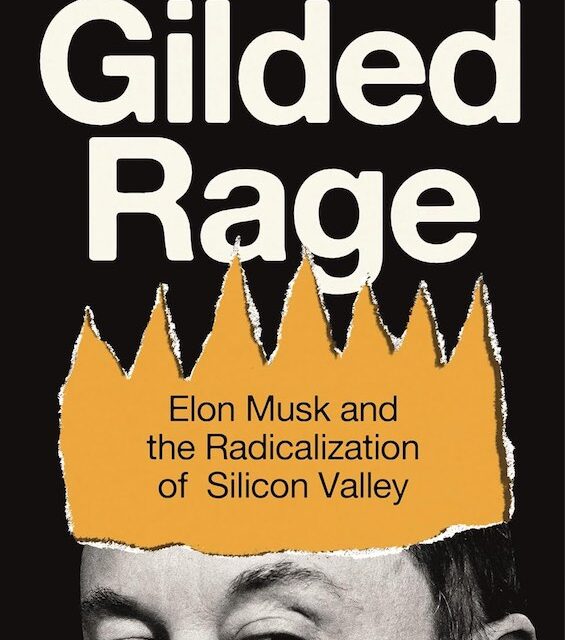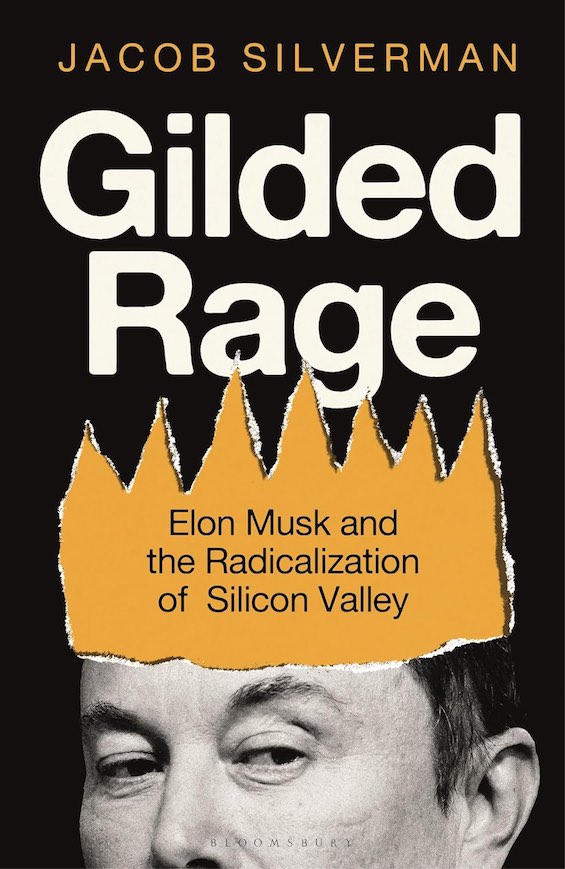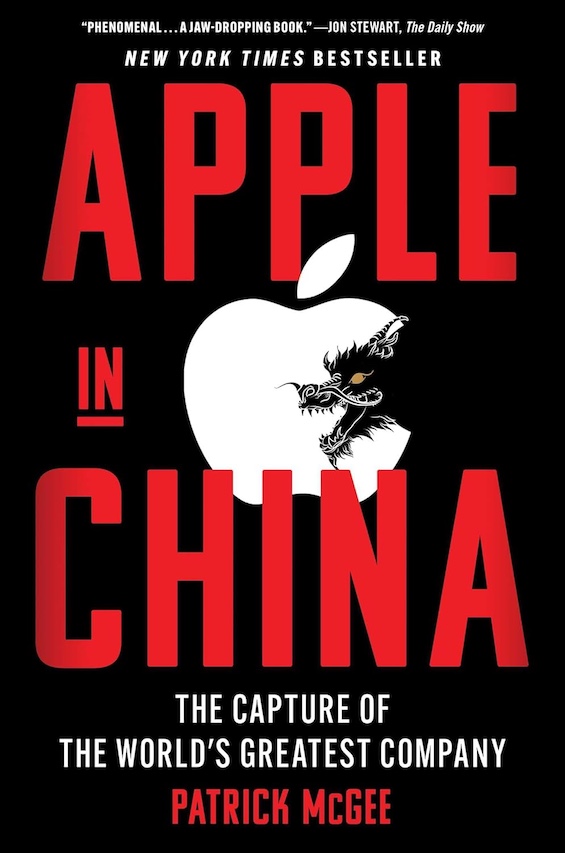In 1998, three ambitious Silicon Valley entrepreneurs established a startup called PayPal. These three hustlers—Max Levchin, Peter Thiel, and Luke Nosek—later merged with Elon Musk’s company and enlisted eight or nine others. Together, they became the PayPal Mafia. The company survived the tech crash. And since then at least four of the “founders” have become billionaires. Elon Musk, of course. Peter Thiel (Palantir). Reid Hoffman (LinkedIn). Max Levchin. Perhaps David Sacks, too. And at least four others have amassed hundreds of millions. Many of these same names—most prominently Musk, Thiel, and Sacks—loom large in the sad story of how the tech bros of Silicon Valley helped enable Donald Trump’s election to a second term, guided tech policy, and staffed many of the key posts in his administration. In Gilded Rage, journalist Jacob Silverman tells the tale of Silicon Valley’s partnership with Donald Trump with ill-disguised distress.
A sprawling cast of influential characters
For obvious reasons, the book’s subtitle (Elon Musk and the Radicalization of Silicon Valley) features only Elon Musk’s name. But as Silverman relates the story, two others—Peter Thiel and David Sacks—were if anything more instrumental in that “radicalization.” Musk gets a lot of attention, of course. It’s hard to overlook the richest person on the planet. Or the head of DOGE, who led the charge to wreck the federal government. But Thiel and Sacks come across as more influential among their peers in the Valley. For example, Sacks is Trump’s “White House AI and crypto czar.”
But parallel with Silicon Valley’s strategic move to the right was the explosive emergence of cryptocurrency. The crypto industry has played a guiding influence in the administration. While the tech bros all support crypto, that industry involves an almost wholly separate cast of characters. They enter into the story, too. And a disturbingly large number of them are crooks, pure and simple.
Gilded Rage: Elon Musk and the Radicalization of Silicon Valley by Jacob Silverman (2025) 389 pages ★★★★★
The larger context of this story
Gilded Rage artfully tells the story of how high tech and the extraordinary profits it has generated played a pivotal role in Donald Trump’s reelection in 2024 and in the administration he then put in place. Understandably, though, that story lacks context. It’s long and complicated enough as it is. But it’s only the latest chapter in the 60-year rise of the Republican Right and its transformation into an authoritarian force. That story began—if in fact, any story can truly have a beginning—with Barry Goldwater in the 1960s. Later, other characters came on-stage in leading roles as the so-called “conservative” movement gained steam. Richard Nixon, of course. Justice Lewis Powell. Milton Friedman. Ronald Reagan. Newt Gingrich. George W. Bush. Dick Cheney. And numerous others, far less well known. They all played their part in paving the way for today’s emerging Right-Wing dictatorship.
In some ways, however, the role of the tech bros is unique. Not only have they provided the financial muscle to enable Donald Trump and the sycophants around him. They’ve also contributed intellectual capital. And, most importantly, the software produced by some of their companies has provided the Trump Administration with the tools it needs to power the police state they are moving to establish.
That’s the true context of the story Jacob Silverman tells in Gilded Rage.
Summary of the book by AI
I turned to the chatbot Claude (Version Sonnet 4.5) for a summary of this book. What follows is the result, word-for-word. I’ve only deleted the URLs linking the text to its sources and inserted subheads.
A rightward shift toward Donald Trump
Gilded Rage examines the political radicalization of Silicon Valley’s tech elite and their rightward shift toward supporting Donald Trump and far-right politics. While Elon Musk sits at the center of Silverman’s investigation—particularly his obsession with the “woke mind virus”—the book extends beyond one individual to reveal a broader network of tech and finance oligarchs reshaping politics and society.
Silverman explores how figures like Peter Thiel, Marc Andreessen, David Sacks, and JD Vance form an interconnected web of radicalized billionaires who, emboldened by the zero-interest rate era, are using their enormous wealth to advance an increasingly extreme political agenda. The author examines why these individuals, who were once considered liberal darlings promoting a cleaner and more connected future, have taken such a dramatic rightward turn.
Observing the real-world consequences of Right-Wing policies
Silverman identifies San Francisco itself as a catalyst for this transformation, with the city’s progressive policies on homelessness, prosecutorial reform, and equity initiatives becoming symbols of decline for these billionaires, fueling their reactionary politics. The book covers topics ranging from potentially dangerous artificial intelligence pursuits to life-extension startups promising eternal youth, illustrating how the original techno-utopian vision of Silicon Valley has deteriorated.
Traveling across San Francisco, Silicon Valley, Austin, Miami, New York, Washington DC, and various global centers of tech and finance, Silverman interviews people experiencing the real-world consequences of this political revolution. He describes a bizarre and sometimes frightening world where moguls preach populist revolt while systematically dismantling democratic checks on their power.
Handmaidens to authoritarianism
The book addresses the contradictions in these figures’ positions—they claim to be libertarians while supporting the military-industrial complex, and position themselves as free-speech champions while helping foreign governments surveil dissidents. Silverman covers major incidents including Sam Bankman-Fried’s FTX collapse and Elon Musk’s Twitter takeover, while also highlighting local stories like venture capitalist David Sacks’s involvement in recall campaigns and the California Forever project to build an entirely new city on farmland.
Through detailed reporting and analysis, Silverman presents an urgent examination of how Silicon Valley’s wealthiest individuals have become handmaidens to authoritarianism, offering essential insight into the forces reshaping contemporary politics and democracy.
About the author
Jacob Silverman is the author of two other well-received nonfiction books, one on social media, the other on cryptocurrency. He’s a contributing editor at The New Republic and The Baffler, and his work has appeared in the Los Angeles Times, New York Times, Washington Post, Vanity Fair, and many other publications. He lives in New York.”
Silverman notes on his author website that he writes “about the politics of tech, political corruption, illicit finance, the nihilism of our forever wars, [and] the depredations of a clueless media,”
For related reading
I’ve also reviewed Elon Musk by Walter Isaacson (A revealing new biography of Elon Musk). And I previously reviewed an earlier biography, Elon Musk: Tesla, SpaceX, and the Quest for a Fantastic Future by Ashlee Vance (Elon Musk wants to build a colony on Mars (for real)).
I’ve also reviewed two other books in which Elon Musk is a principal figure: The Space Barons: Elon Musk, Jeff Bezos, and the Quest to Colonize the Cosmos by Christian Davenport (Four billionaires and humanity’s future in the cosmos) and The Founders: The Story of PayPal and the Entrepreneurs Who Shaped Silicon Valley by Jimmy Soni (A group biography of the PayPal mafia).
You’ll find other, related books at:
- The 5 best books about Silicon Valley
- My 10 favorite books about business history
- Good books about billionaires
- The top 7 books about Donald Trump
And you can always find the most popular of my 2,400 reviews, and the most recent ones, on the Home Page.
































